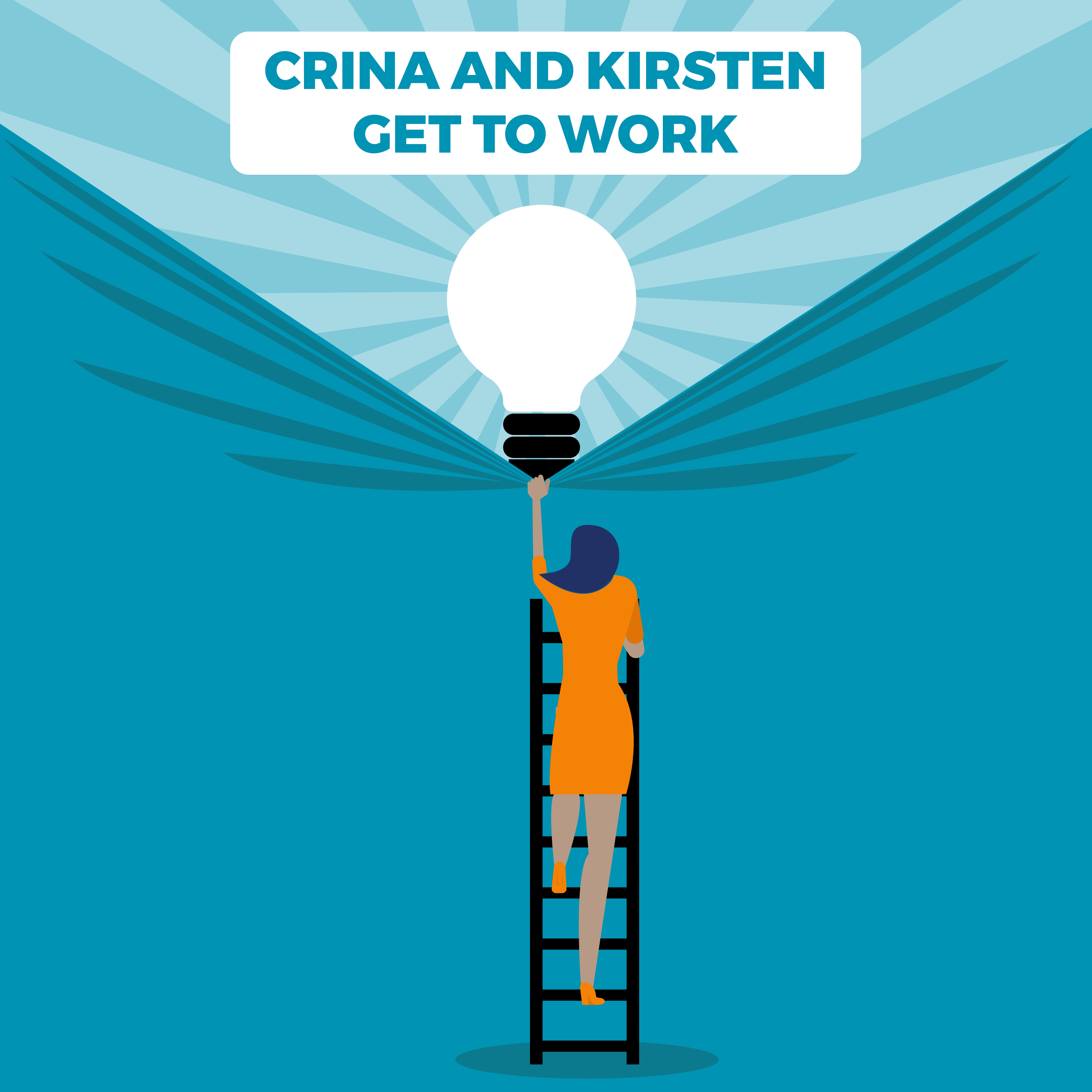Crina and Kirsten Get to Work

We have one single mission: Help women find ease, meaning and joy at work and in life. We use our experiences as business owners, entrepreneurs, mentors and inspirational leaders to explore topics that all working women care about: shitty bosses; smashing the patriarchy; balancing work and life; navigating change and getting what you want! We guarantee that you will be entertained and inspired... promise!
Episodes
Episodes



Friday Jan 14, 2022
Resilience: How to survive (and maybe even thrive!) in difficult situations.
Friday Jan 14, 2022
Friday Jan 14, 2022
WOW! Resilience is amazing! Not only is it a powerful tool to minimize stress, improve performance and create more ease, meaning and joy…it’s something we can all develop in ourselves! Simple, daily practices have proven effective at building resilience and helping folks deal with difficult situations; manage emotions and generate a positive outlook about life. We could use some of that right now!
SHOW NOTES
On this episode of Crina and Kirsten Get to Work, the timely topic for tillitating tete a tete between our co-hosts is resilience. Let’s be honest - we are two years into a pandemic, regardless of your political persuasion many feel political and economic certainty and, oh yes, let’s add all of the regular challenges of being human in this world. IT’S A LOT! So what do we need - of course we need ease, meaning and joy - and there are good things out there - a dear friend, a beautiful sunrise, a long walk, a sweet dog - lot’s of good things. We just need to get ourselves in a place where we can enjoy those things and that is where resilience comes in.
Adversity doesn't discriminate. If we are alive, we are going to have to, or have already had to, deal with some tough times. Navigating those tough times requires resilience - and resiliency is something we control.
In the world of positive psychology, resilience is being able to recover and adapt quickly from a traumatic event or stressor. In other words, it’s a kind of inner strength. Generally speaking, resilient people have a positive outlook; deal with difficult situations with ease and don’t exhibit excessive negative emotions during difficult times.
Resilience helps us minimize stress, improve performance and leads to more ease, meaning and joy at work. But a word of caution - some folks are critical of the ' ‘resilience movement” because it puts the burden on the individuals who have little control over the systems they’re affected by. Think of racism or sexism or ableism. While resilience can be very helpful in these situations, an individual’s resilience does not, for example, resolve racism. Resilience can help us manage but it is not a solution for systemic distrimination.
The good news is that because there is a concrete set of behaviors and skills associated with resilience, you can learn to be more resilient.
One, resilient people get that shit happens. They know that suffering is part of life. This doesn't mean they actually welcome it in, they're not delusional. But, resilience people seem to accept that suffering or challenges are part of every human existence.
Two, resilient people are really good at choosing where to focus their attention. They analyze a situation and focus on the things they can change and accept the things they cannot change.
It is not about diminishing the negative as much as it is focusing on where they can get traction in changing their situation.
Three, resilient people ask themselves, iIs what I'm doing helping or harming me?" They seem to be aware of whether their actions are taking them in the directions they want to go - or not. This requires self-awareness and honesty.
Four, resilient people respond to stress rather than reacting and to stress and mental agility, which is the ability to cognitively take a step back from the experience, label thoughts and emotions and change their attention and/or the narrative about the situation.
Five, resilient people compartmentalize so that they are not juggling or managing too much. This is similar to where resilient people direct their attention - and sometimes it makes sense to ignore some things and focus on others..
Six, resilient people understand the importance of connection - knowing they have a circle of support and being able to reach out if necessary.
Seven, humor, which is an indicator of a positive outlook in general, also contributes to resilience - for all of the reasons - endorphins, a flat stomach . . ..
Eight, resilient people have optimism and hope or or belief or something like it - this can be a small kernel of hope or a belief that something good will happen.
Resiliency is a skill we can learn and improve over time and with practice. Resiliency can be as small and simple as enjoying a hot bath at the end of a hard day or as big and complicated as losing a job, taking steps to redefine what we want in a job and getting out there to get it.
References and good reads:
5 Ways to Boost Your Resilience at Work
Lucy Hone: 3 secrets of resilient people | TED Talk



Friday Dec 31, 2021
End of the Year Tune-Up Part 2: Setting Intentions
Friday Dec 31, 2021
Friday Dec 31, 2021
Twelve months from now you will feel, experience, imagine and embody something. Do you want to be in the drivers’ seat or leave it up to chance? Setting intentions and working toward your goals is the way to get, become, dare we say manifest(?) exactly what you want for yourself, your life and your work.
SHOW NOTES
In this episode of Crina and Kirsten Get to Work, we get to ring in the New Year with Part 2 of a 2 part series on Reflections and Realizing Intentions. In Episode 75 (what?!! 75 episodes!) we learned about the power of reflection. Reflecting on the past year is a great start to setting intentions for the new year - and this episode focuses on how to make those intentions real. As Crina says - and she says someone else said it - you are going to be someone in 12 months, you are going to have done things in 12 months and experienced things in 12 months - so who do you want to be and what do you want those things done and experiences had to be?
Last year we focused our “intentions” episode on setting mental intentions to achieve who we want to be, how we want to feel and how we want to react.
Take some time to reflect on last year - and organize the reflections. It can be as simple as good and bad or you can define the categories you most resonate with. Kirsten uses emotional, physical, work, relational, financial and spiritual. Pick whatever feels right.
Once we reflect on last year, think about what we want to repeat (or not) in the coming year. We can set specific goals - anything from finding that new job, going on a date a month or creating one new experience a month - whatever our jam is, this is the time to clearly define it and set a goal. And those goals can mirror your reflections - or not.
Once we set goals, we can direct our intentions to make those goals come to life. How do we focus our intentions so that “stuff happens?” Depak Chopra writes, “intention is the starting point of every dream. It is the creative power that fulfills all of our needs, whether for money, relationships, spiritual awakening, or love.” So, Depak, how does that work?
Many people find that reminders are helpful - post goals on the bathroom mirror, create a vision board or a vision box, journal and make a commitment to review that goals list once a week or once a month. If we set a goal in January that does not feel good in August, dump it. We can be flexible and allow for the space to change our minds.
Some people believe that just imagining it can make it so - those are The Secret folks. And while there is certainly magic in the Universe and sometimes those things just happen - it’s usually not the case. A friend of Kirsten has had many goals of owning a second home somewhere and the opportunity seems to appear out of nowhere - so much so that the friend’s husband has asked her to stop. This is not most of our experiences.
Other people advocate for positive thinking, but it turns out that is not what it is cracked up to be. Gabriele Oettingen is a Professor of Psychology at New York University and at the University of Hamburg. She wrote “Rethinking Positive Thinking” which synthesizes 20 years of research on the science of human motivation. The research shows that positive thinking is much less promising than we think. In the moment, positive thinking gives us pleasure, but in the long run if we simply have positive thoughts, we put in less energy and have fewer successes towards our goals. This leads to reduced happiness and loss of motivation.
Positive thinking is very helpful to explore possibilities in the future - and here is the catch, when positive thinking is combined with a good sense of reality.
It turns out that small steps and planning have a lot of influence on whether you achieve your goals.
It is important to take one small step towards your goal - and then another and another and another - and soon enough you will be there. Kirsten tells a story about Dr. Nicole LePera who essentially changed her whole life by starting with drinking a glass of water every morning to begin to hydrate her body for the day. If you want to save $1000, start with $100 - or even $10.
Another strategy is to plan, which is well articulated in a system called WOOP - in fact that is the name of the website advocating this method. According to the WOOP (which stands for wish, outcome, obstacle, plan) website, “The obstacles that we think most impede us from fulfilling our wishes can actually help us to realize them. WOOP instructs us to dream our future dreams but then to imagine what obstacles inside ourselves prevent us from achieving these dreams.” In other words, we need to understand what we want, what does getting it look like, what will get in our way and how to we get around, through or over that obstacle.
The New Year is a great time to go through this process of reflection, goal setting, intention setting and directing and goal actualization, but we can do this any time of year or multiple times a year. Our lives are precious - creating something we love will give us ease, meaning and joy!



Friday Dec 17, 2021
End of the Year Tune-Up Part 1: The Power of Reflection
Friday Dec 17, 2021
Friday Dec 17, 2021
Reflection is important for skill building, mastery, self awareness and self assessment. We learn from what happened so next time it can be intentionally the same - or different. This is a key component to creating ease, meaning and joy in your life and in your work.
SHOW NOTES
Today on Crina and Kirsten Get to Work, our work babes reflect on the power of reflection. Sometimes we intuitively know something is helpful, and that is true for reflection, but the statistics on the effects of reflection are particularly compelling.
WARNING - do not proceed if you are going to beat yourself up about the past - this is a learning experience. No beating up!
Reflection is pretty simple - it is thinking about what you do, say, feel, experience and perceive. It is closely linked to the concept of learning from experience in that you think about what we do, feel and perceive and what happened, and consider whether we would do differently next time - or hopefully whether we have landed on the magic formula.
Thinking about what has happened is part of being human. However, the difference between causal ‘thinking’ and ‘reflective practice’ is that reflective practice requires a conscious effort to think about events, and develop insights into them. And here is that word again - curious! It's about getting curious. Once you get into the habit of using reflective practice, you will probably find it useful both at work and at home.
Reflection is important for skill building, mastery, self awareness and self assessment. We learn from what happened so next time it can be intentionally the same - or different. This is a key component to creating ease, meaning and joy in your life and in your work. Looking back when things go well: we learn what worked for us and know we can use those behaviors or strategies again to our advantage. Looking back when things go poorly: learning from hindsight is not about wishing you had done things differently, which is more like regret. It’s getting curious about whether there is anything you want to do differently going forward. But be careful of what is called hindsight bias: which is the tendency for people to perceive past events as having been more predictable than they actually were - meaning that we think we had more control over the outcome than we actually did.
WHAT THE DATA SAYS:
Recent research from the Harvard Business school into the power of reflection showed that when employees spent 15 minutes at the end of their day reflecting about what they’ve learned, they’ve improved their performance by 23% in just 10 days, in comparison to those who did not reflect. Amazing - huh! Can you imagine increasing your performance not just at work, but in your life as well just through 15 minutes of reflection?!.
Giada De Stefano, professor at HEC Paris - an economics and business management school, tells us we work five more weeks per year now than we did in the 1970s. This means that gains in productivity are the result of working more - not working differently. Stefano proposes that we do not need to give more time to work to increase performance and productivity. In fact, we need to do less and think more.
To Stepfano’s point, studies have found that, once we have gathered a certain amount of experience, the benefit of continuing to perform similar tasks is far inferior to that of pairing that experience with efforts to analyze and reflect on it. And it turns out that more training has its drawbacks as well - because according to BetterUp we forget about 75% of it! Research has found that, regardless of work experience, all employees experience loss of knowledge over time. The amount of information that people remember depreciates over time, but this occurs at a significantly higher rate among individuals who work for organizations who don’t actively practice reflection (Argote & Miron-Spektor, 2011). It turns out practice and training have their limits in increasing productivity. Reflection is that secret sauce to add in.
The data tells us that reflection not only improves productivity and performance, but it also makes us feel better. Studies show that brief, positive reflection practices at the end of a work day can lead to decreased stress and improved health. Bono, J. E., Glomb, T. M., Shen, W., Kim, E., & Koch, A. J. (2013).
WHY DOES REFLECTION WORK:
Research shows reflection is critical to helping us deepen and integrate learning, and effectively apply it to our work and our lives. ( BetterUp) It is like the glue of progress - it seems to help it all stick and be solid.
HOW TO BUILD REFLECTION INTO YOUR WORKPLACE
Reflection is simple and building reflection into your day can also be simple. BetterUp has some great examples for managers, including:
Communicate the value of taking time for quality breaks
Encourage employees to schedule whitespace into their day to allow for reflection
Hire a coach for yourself or your employees - or ask a trusted friend or colleague to be your reflection partner
Do a project post-mortem
Integrate reflection into meetings
We can also do this ourselves. Self-reflection requires us to look at ourselves with interest, curiosity, and inquiry, particularly when exploring our thoughts, behaviors, perceptions and emotions.
Set aside some time - even starting with once a week - the same day and time every weekCreate a list of questions for yourself
Learn to identify and question your assumptions and perceptions
Give yourself some time to check in to your feelings
Take time to reflect in-the-moment, whenever you try a new task
Talk with colleagues about your experiences
Ask for feedback and observation from co-workers/supervisors
Write down your reflections - even just brief phrases and sentences - looking back on these reflections is powerful.
As we end this year, this is a perfect time to look back as we move into a new year to set our intentions and plans for what we want to create for ourselves in the new year.
Good Reads:
The Power of Reflection in Workplace Learning
Making Experience Count: The Role of Reflection in Individual Learning by Giada Di Stefano, Francesca Gino, Gary P. Pisano, Bradley R. Staats :: SSRN
Reflecting on Work Improves Job Performance - HBS Working Knowledge
How to Practice Self-Reflection at Work | by Neve McBeal | The Startup | Medium
The power of reflection at work: Insight by HEC Professor Giada di Stefano | HEC Paris
Reflective Practice | SkillsYouNeed
Getting started with Reflective Practice



Friday Dec 03, 2021
Workplace Norms: What‘s ”normal” at work, anyway?
Friday Dec 03, 2021
Friday Dec 03, 2021
Workplace norms are those rules, behaviors and ways of going that define how we work together. When teams discuss and define their norms, they create safe workplaces for folks to succeed. When we are unaware of our workplace norms, we can fall prey to unspoken rules about professionalism, duty, work, etc that are difficult to navigate; frequently confusing and often rooted in sexism and racism.
SHOW NOTES
Norms are essentially expectations of the group and can be conscious and formal, or unconscious and informal. A couple of examples of group norms at work include the expectation that all members show up at group meeting times, that all group members focus on the group instead of personal matters (for example, turning cell phones and other distractions off), and that group members finish their part of the work by the established due date. Norms are also expectations such as don’t disagree with the boss or don’t ask your assistant to perform personal errands for you.
Gender norms are particularly problematic at work. Gender norms are learned in the home and reinforced in school, at work, in our institutions and in our social interactions. They perpetuate power differentials and equality and often negatively impact women.
Norms around race, while more complicated, are created similarly to the way gender norms are created. White norms often define what is “professional” at work - in everything from hair to grammar. Defining professional as primarily white cultural norms excludes and separates people from other cultures from the workplace.
Norms do have a positive side - they simplify group process - when we know the “rules” we know how to act and do not have to guess.
There are two kinds of workplace norms - technical norms and social norms. Technical norms focus on skills and information and are communicated by policies, procedures and rules. Social norms guide interactions, particularly with regard to conflict, challenge, accountability and disagreement. Social norms are transmitted through observation or trial and error. For example, not disagreeing with the boss is learned by observing not from the employee handbook.
Workplace norms change over time, which is good because there are some workplace norms that need to change. Top candidates for change include getting rid of long and painful meetings, mandatory afterwork events, set work hours, coming to work sick, work - life separation and micromanaging. What would you add?
GOOD READS
Establishing and Maintaining Group Norms
Politics, love & slacking: Managing new workplace norms | HR Morning
7 Workplace Norms That Need to End in the New Normal (idesign.com)
The Bias of ‘Professionalism’ Standards (ssir.org)



Friday Nov 19, 2021
Empathy: Cultivating Compassion at Work
Friday Nov 19, 2021
Friday Nov 19, 2021
Cultivating an empathetic workplace is all the rage, but how do we do it? It begins with a commitment to ensure that empathy is baked into your workplace culture. Next, you and your coworkers need to be willing and able to recognize and respond to each other’s emotions. Finally, when you truly act in order to relieve each other’s suffering, you may have found the key to unlocking the benefits of empathy.
SHOW NOTES
Today on Crina and Kirsten Get to Work our gals engage in an exciting exchange on empathy. Let’s get clear about what we are talking about. We often use sympathy, empathy and compassion interchangeably and narrowing down on what each means helps us better understand the concepts.
Sympathy means we can understand what the other person is feeling.
Empathy means that we feel what a person is feeling.
Compassion is the willingness to feel what a person is feeling and to relieve the suffering of another.
Now that we know what we are talking about, why are we talking about empathy? Because it turns out it is a really good thing and we all should want to give and receive more of it in the workplace. We rarely “should” on our listeners, but this is a first for a reason. Empathy is powerful.
Of course, Brene Brown has created a spectacular and hilarious video should be the first stop on a tour of empathy. Brené Brown on Empathy - Bing video
It turns out that we are hardwired for empathy. Children as young as two demonstrate an appreciation that others hold perspectives different than their own, as evidenced in a study at Lund University in 2018. Lund University, And research at the University of Virginia found when people saw their friends experiencing threats, they experienced activity in the same part of their brain which was affected when they were personally threatened. See - literally - empathy is wired into our brains.
Empathy contributes to better mental health, better physical health and more ease with work-life balance for employees. And it turns out that what is good for employees is good for employers - empathy increases innovation, engagement, inclusivity and performance, according to a .2021 study by Catalyst.
What about the gender gap in empathy? Women self-report that they are more empathetic; however, it turns out the vast majority of studies on this issue report no significant gender difference in empathy ability.
How can we bring more empathy to work:
Give your full attention to people
Consider other people’s perspectives
Actively support people
Start meetings, calls, emails and other communication with a personal check in
Open your written communication with a signal of gratitude
Ask specific questions (not “how’s it going) and be curious about the answer/body language
Speak directly with individuals
Show active listening skills
Follow up after life events (how was your time with your parents this weekend?)
Create more informed policies and statements about social issues
See The Power of Empathy in Times of Crisis and Beyond (Report)



Friday Nov 05, 2021
The ”Good Enough” Job
Friday Nov 05, 2021
Friday Nov 05, 2021
Is your job your singular focus or simply a way to fund your passion? Is your career the thing that defines you, or do you identify as something different...something unrelated to your work? Do we put too much pressure on our careers to deliver happiness? Ease? Meaning? Joy?
SHOW NOTES
Today on Crina and Kirsten Get to Work out hosts talk about the concept of good enough as an important part of ease, meaning and joy.
Pascal Bruckner said, “unhappiness is not only unhappiness,; it is, worse yet, a failure to be happy.” This quotation acknowledges the expectation that we all be “happy” and when we are not, we have somehow failed, missed the point or missed out generally. The point of this show is to explore that possibility that “good enough” can actually contribute to ease meaning and joy.
Some people, like Kirsten, experience work as deeply meaningful – although stressful. Crina’s son works when he needs money. These are two very different approaches to work. Is it realistic for everyone to “pursue their passion? Do you really have to find a dream job so you never work a day in your life? Can it actually be about something more than the money – or is it just a matter of paying the bills?
Our hosts posit that putting pressure on ourselves to create the perfect job probably takes away from ease, meaning and joy at work – and at the same time, is there something more than just a paycheck?
Rather than dig into the research, our hosts dig into the history. The idea that we love our work is a relatively new phenomena. Historically, work was never supposed to be enjoyable. In fact, author Sarah Jaffe, whose book Work Won’t Love You Back hits stores in January of 2022, argues that the “love your work” mantra is a myth of capitalism.” She says that in the 1970s, just when manufacturing began to die and labor movements began to lose ground, bosses started handing down aphorisms like, “Do what you love and you’ll never work a day in your life.”
When we carry the belief that we must find meaning and fulfillment from work, we can be disappointed – and we can neglect other parts of our lives. If our jobs are our sole source of fulfillment, we not only create unrealistic expectations, but also miss out on other parts of our lives.
Enter the idea of the "good enough" job – relatively enjoyable paid work that meets your financial needs while leaving you with enough time and energy to pursue your passions and callings outside of work. Maybe you love the people you work with, or the work that you do – or even the mission of your employer – the point is that there is something in the job you find enjoyable.
The "good enough" job embraces the reality that not everyone’s call is this work, the "good enough" job leaves you time to focus on other meaningful aspects of your life – art, music, volunteering, reading, relationships etc. The "good enough" job is more flexible because you have less investment. It is easier to leave a "good enough" job to do something else because your interests have changed or to move somewhere else. Because there is less energy and connection and commitment to the "good enough" job, it is less likely to hold you back from other parts of your life. Consider, friends, the "good enough" job!
Good Reads:
Fredi Founders Discuss The Fallacy Of "If You Love What You Do, You'll Never Work a Day in Your Life." Why Wellness, Not A 'Dream Job', Is The Key To Fulfillment At Work
In Praise Of 'Good Enough' Jobs — What A Girl Gotta Do
Why Young People Want Comfortable, "good enough" jobs
The Research We've Ignored About Happiness at Work



Friday Oct 22, 2021
Burnout
Friday Oct 22, 2021
Friday Oct 22, 2021
Burnout feels like depletion, exhaustion, disconnection, negative emotions and reduced capacity...sound familiar? You’re not alone! In fact burnout is so pervasive that over seventy-five percent of the workforce is currently, or has previously experienced it.
SHOW NOTES
Burnout is a real diagnosis - and defined as “chronic workplace stress that has not been successfully managed” by the World Health Organization. This relatively new diagnosis is defined as a “syndrome conceptualized as resulting from chronic workplace stress that has not been successfully managed. It is characterized by three dimensions: 1) feelings of energy depletion or exhaustion; 2) increased mental distance from one’s job, or feelings of negativism or cynicism related to one’s job; and 3) reduced professional efficacy. Burnout refers specifically to phenomena in the occupational context and should not be applied to describe experiences in other areas of life.”
Christina Maslach (creator of the Maslach Burnout Inventory) first identified the syndrome - and it came out of her work with healthcare workers and their families. Here are her inventory questions:
How often are you tired and lacking energy to go to work in the morning?
How often do you feel physically drained, like your batteries are dead?
How often is your thinking process sluggish or your concentration impaired?
How often do you feel emotionally detached from co-workers (or customers) and unable to be sensitive to their needs?
Does it sound like you? If you are like most of us - yes, at least some teimes.
How does this happen? When we carry too much for too long and cannot effectively process our emotions, our neurological system gets overloaded - and we are unable to effectively deal with this overload.
Who does this happen to? Well, all of us, but those of us that are anxious or have a low self esteem or poor boundaries are thought to be more likely to suffer burnout, according to a study of Spanish nurses. According to authors Rachel Montane and Erika Pryor, women of color also carry the emotional burden of discrimination, fear of retaliation - and of course much of the emotional labor of diversity in the workplace..
Employers contribute to burnout by unfair treatment, an unmanageable workload, unrealistic deadlines, poor communication and a lack of support.
Enter Drs. Emily and Amelia Nagoski, authors of Burnout, who just happen to be identical twins. They have concluded, based on their research, that the key to preventing burnout is to manage the emotions you are having so that we do not become emotionally exhausted. They encourage us to process the emotion - actually turn towards it, and feel it. Scary!! But we can do it.
Here are the twins’ suggestions to deal with, process and get on the other side of our emotions.
Engage in physical activity
Try breathing exercises
Make positive connections with people you love and care about (call someone or better yet go for a walk with a friend)
Laugh - a great big belly laugh
Hug for 20 seconds - the full slightly uncomfortable 20 seconds
Cry - they promise it will not go on forever
Be Creative - paint, sing, dance, write
The key is to send our body a signal that the danger is over, we are safe. And how do we know our emotions have been processed and we are “done?” The twin doctors promise your body will tell you.
Be aware of your depletion clues. Are you sleeping well and enough? Are you engaging in activities where you do not think of work? Are you taking breaks at work? Do you have work-life boundaries?
The solution to burnout is actually more than self-care. It is more about managing emotions.
While burnout is prevalent, there are things we can do to recognize our vulnerability, determine whether it is happening to us and work to relieve that chronic stress through the processing of emotions.
More good reads:
How to Recover From Burnout & Love Work Again According to Science
How to Eliminate Burnout and Retain Top Talent



Friday Oct 08, 2021
When Is It Good Enough? Toxic Perfectionism at Work.
Friday Oct 08, 2021
Friday Oct 08, 2021
While "perfect," is an unattainable standard, many people struggle to accept the inevitable: that striving for the impossible goal of perfection leads to stress, burnout, sickness and feelings of failure.
SHOW NOTES
We know that perfection is the state of being without flaw or defects - and we all know that perfection is not really attainably. It may be that some of us everyone once in a while achieve perfection, but perfection is not something most of us achieve. Perfectionism is the refusal or inability to accept anything short of perfect. Friend, do you see the cognitive dissonance here, the undeniable catch-22? Perfectionists are trying to achieve the unattainable. Painful - to the individual who is the perfectionist as well as those around her.
We want to make sure not to confuse high achiever with perfectionist. And there are even some great descriptions for this.
Adaptive perfectionist: aka high-achievers: adaptive perfectionism means that a person thrives on doing some, but crucially not all, things well. In the words of Stoltz & Ashby 2007 “adaptive perfectionism is characterised as a normal, healthy type of perfectionism and is defined by deriving satisfaction from achievements made from intense effort but tolerating the imperfections….”
Adaptive perfectionists are the women who embrace the reality that it’s simply impossible to achieve complete perfection and instead aim for a high standard of work in those tasks they do well, and that play to their unique strengths. These women are telling themselves more of the truth about who they are and the circumstances that are in - they are adaptive.
Maladapted perfectionism is such a great descriptor because we start off right away knowing this is not a good thing. The maladapted perfectionist is likely on a path to pain. These women are very hard on themselves when perfection is not achieved. And these kinds of unrealistic expectations and responses lead to depression, anxiety and increased levels of stress.
We can have high standards, the question is what happens when reality comes crashing in and our high expectations have not been mer. Failure is inevitable - and, you guessed it - far more stressful on the maladapted gal than the adaptive gal. Crina shares a story about her own sense of perfectionism getting in the way of her own fun - she wanted to be excellent and when she was not, she gave up - until, smarty chick that she is - she realized that approach was no way to love and it was far better to have more fun - even if she was not excellent at whatever was fun.
As with most things, none of us neatly fall into one category or another and may see ourselves in both. What are the indicia of tipping over into maladaptive rather than the sweet spot of adaptive:
Do people tell you you are difficult to change
Do you want to change your body?
Do you notice others’ mistakes?
Do you notice the mistakes you made?
When you try something new that you are not good at - do you give up?
Do you focus on the success or the failure?
Do you procrastinate or avoid tasks regularly?
Mistakes are flaws versus opportunities to learn?
Kirsten shares that the legal profession is toxic perfectionism. Making a mistake can hurt your client - and is malpractice - there is no room for mistakes. It is the part of practicing law she has most struggled with over her career because it is based on a falsehood - we all make mistakes and that standard of perfection fails to acknowledge the human behind the work.
The disturbing news is that perfectionism is on the rise. A 2019 study that evaluated more than 40,000 college students found a 33% rise in perfectionism from 1989 to 2016.
But this should be good news for the workplace, right? We want a bunch of perfectionists doing great work, right? Surprisingly, no - we do not! A vast meta-analysis of 30 years of studies, conducted at the Georgia Institute of Technology, found there was no relationship between perfectionism and job performance for either group (failure avoiding or excellence seeking) , says researcher Dana Harari, who worked on the meta-analysis. “To me, the most important takeaway of this research is the null relationship between perfectionism and performance,” she says. “It's not positive, it's not negative, it's just really null.” Is that the craziest thing? Perfectionism does not lead to better work performance.
You know our hosts are not going to leave our lady friends hanging!
Go for the B
Give 80%- As Cinzia BuBois says, “Giving 100 percent should be saved for those special passion projects or for those most treasured people in your life. If you give 100 percent to everything and everyone around you, the quality of your output will go down. You’ll become burnt out, exhausted, and resentful. Not only is 100 percent unrealistic, it doesn’t allow room for learning. Getting an 80 percent always puts you in the higher tiers of anything in life; it’s not perfect, but it’s still rather outstanding. By striving for 80 percent, you allow room for perseverance, flexibility, and diligence, uncorrupted by the fear of failure (or rather, imperfection).” The Perfectionism Epidemic. We live in a society where failure is… | by Cinzia DuBois | Achology
Don’t let perfect be the enemy of the good. Done is better than incomplete or worse, never started
Realizing failure isn’t the opposite of success, but part of it. No one can learn without making mistakes, and no project, skill, or relationship can grow without learning. We’re not supposed to be perfect the first time around
Recovery activities are critical when you do give it your all - you need to rest and restore and re-energize - you know self-care.
To all you fabulous females out there, some of this may be counterintuitive in the workplace, but the data supports that perfectionism is not correlative with performance - and it can cause suffering - to our minds, our hearts and our bodies. Get yourself a B and carefully choose when you bring the A game.
Good reads
Being a perfectionist is good for your career, right?
Obsessed with Perfection: How to Overcome Toxic Perfectionism in a Highly Competitive World
The Trouble with Toxic Perfectionism
The Pros and Cons of Perfectionism, According to Research (hbr.org)
Obsessed with Perfection: How to Overcome Toxic Perfectionism in a Highly Competitive World
Is perfect good? A meta-analysis of perfectionism in the workplace. (apa.org)

Crina and Kirsten Get to Work
Crina and Kirsten dish on all things related to women and work. Through engaging conversations and witty banter, they will inspire you to seize your power and create meaningful, joyous, fun and rewarding work in their business podcast. While exploring motivational podcast topics such as authenticity, shitty bosses, friends and negotiation, Crina and Kirsten lift up women and show the patriarchy “the hand” and “the finger”.








